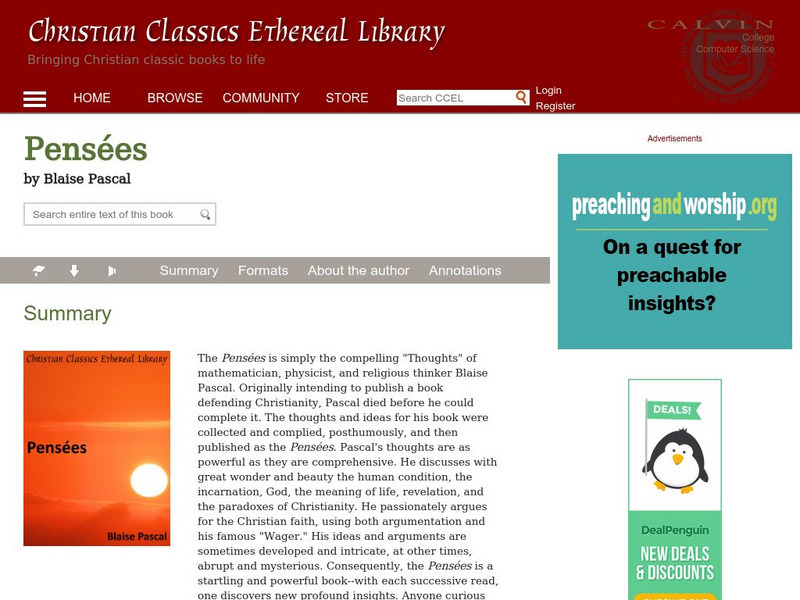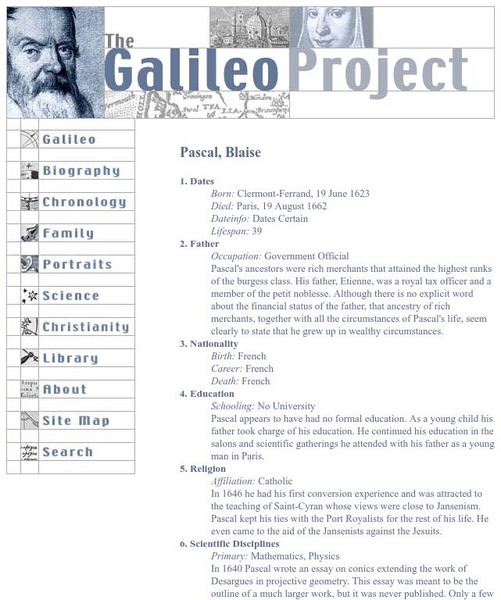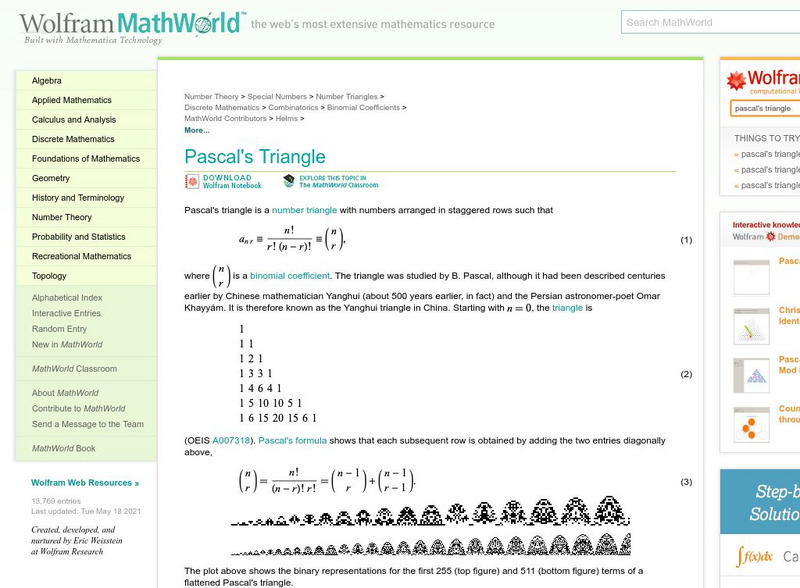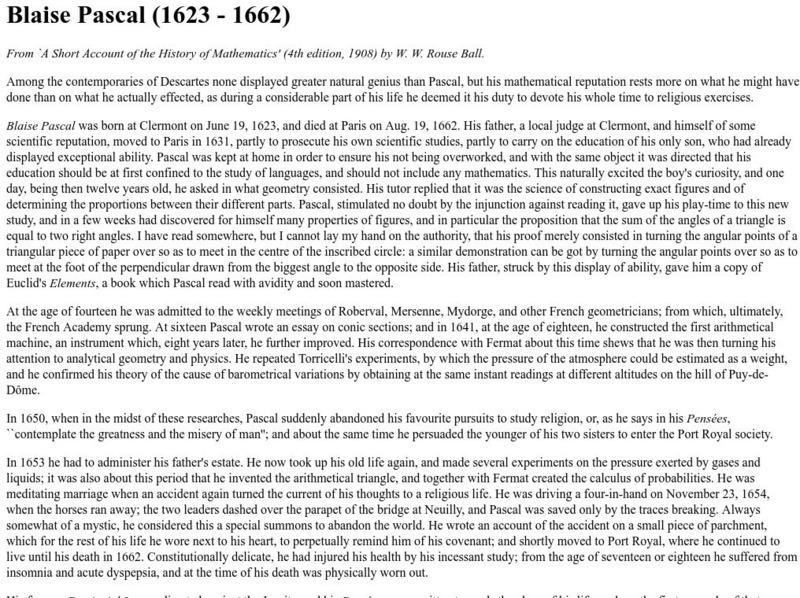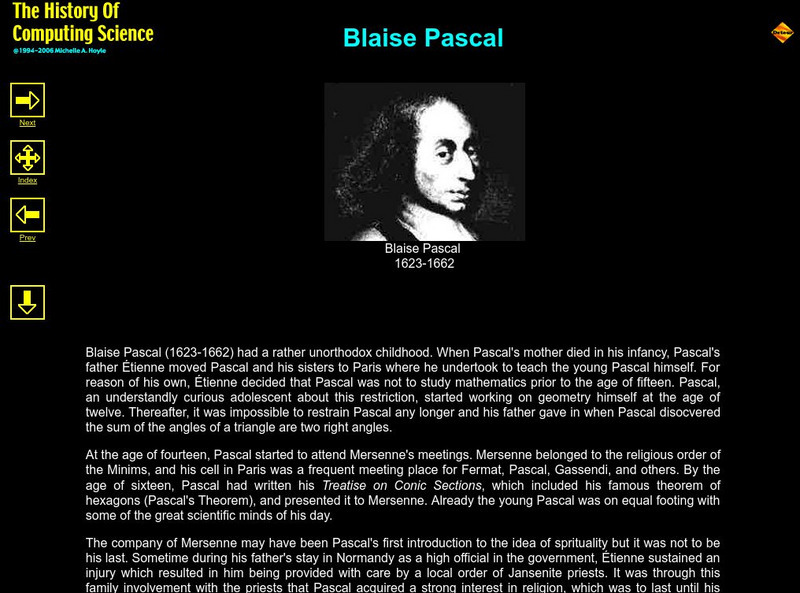University of South Florida
Educational Technology Clearinghouse: Lit2 Go: History of Mathematics
Short selections from W. W. Rouse Ball's "A Short Account of the History of Mathematics," most of which are biographies that focus on the mathematician's work. The text can be read online or downloaded by individual chapters in MP3 or...
Oregon State University
Pascal's "Provincial Letters"
Complete text of Pascal's "Provincial Letters," organized in a table of contents.
Christian Classics Ethereal Library
Uwm Libraries:text of Pascal's "Pensees"
Entire text of Pascal's 1660 Pensees essay(s).
History of Computing Science
History of Computing Science: First Mechanical Calculator
Blaise Pascal, the seventeenth-century French mathematician, thinker, and scientist, built the first mechanical adding machine in 1642 based on a design described by Hero of Alexandria (2 CE) to add up the distance a carriage traveled.
Rice University
Galileo Project: Blaise Pascal
This site from The Galileo Project of Rice University provides information on ten fields of biographical data which are compiled regarding Blaise Pascal, including dates (birth/death), father (occupation/wealth), nationality, education,...
Society of Archbishop Justus
Religious View of Blaise Pascal
Extensive biographical information including religious, literary, and scientific accomplishments.
Wolfram Research
Wolfram Math World: Pascal's Triangle
This site from MathWorld provides great information on Pascal's Triangle. Links are provided throughout for additional information, along with several helpful charts and formulas. This is a good site to check out on the subject.
Great Idea Finder
The Great Idea Finder: Adding Machine
The Great Idea Finder profiles the adding machine, invented by nineteen-year old mathematician Blaise Pascal in the year 1642.
Great Idea Finder
The Great Idea Finder: Blaise Pascal
Blaise Pascal (1623-1662), French philosopher, mathematician, and physicist, is considered one of the great minds in Western intellectual history. He also invented the first mechanical adding machine.
University of California
University of California Berkeley: Blaise Pascal
This site from the University of California, Berkeley provides a biography on the life of Blaise Pascal, including extensive information on his accomplishments.
Steven Kreis, PhD
The History Guide: Blaise Pascal
This site provides a substantial biography of Pascal with excerpts from "Pensees," and the entire text of "Provincial Letters."
Oswego City School District
Regents Exam Prep Center: Binomial Theorem
Students learn about the binomial theorem. The tutorial includes class notes, calculator tips, examples, and practice problems with solutions. The teacher resource investigates the origins of the binomial theorem.
Trinity College Dublin
Trinity College: Blaise Pascal
This site from Trinity College provides a detailed biography of mathematician Blaise Pascal.
Oregon State University
Blaise Pascal Time Line
Year-by-year account of major events in Pascal's life. Includes inventions and major literary works. Also has a graphic of Pascal.
Famous Scientists
Famous Scientists: Blaise Pascal
Find out about the French philosopher and scientist who was one of the greatest and most influential mathematical writers of all time, Blaise Pascal.
Science Struck
Science Struck: Famous Scientists Who Believed in God
It is sometimes assumed that scientists do not believe in God but these famous scientists actually did. Read details about their lives and beliefs, and some quotes attributed to them.
University of St. Andrews (UK)
University of St. Andrews: Blaise Pascal
This University of St. Andrews site contains biographical information and achievements of Blaise Pascal.
University of St. Andrews (UK)
University of St. Andrews: Blaise Pascal
This site from the University of Saint Andrews provides a short biography of Pascal. Takes a philosophical angle. Features links to existentialist philosophy, seventeenth and eighteenth century literature, and philosophy pages.
History of Computing Science
History of Computing Science: Blaise Pascal
Blaise Pascal was a French mathematician, physicist, and religious philosopher. He built the first mechanical calculator. This lecture presents a short treatment of his life and his accomplishments.
Wikimedia
Wikipedia: Blaise Pascal
A Wikipedia encyclopedia article on Blaise Pascal (1623-1662 CE) gives an overview of his contributions to math and physics. It also discusses hisabadonment of the two subjects for religion.
Instituto Latinoamericano de la Comunicacion Educativa
Red Escolar: El Triangulo De Pascal
In Spanish. Find out about the life of Blaise Pascal who discovered the famous Pascal triangle. Use their interactive activities to learn how to fill out the Pascal triangle.
University of Houston
University of Houston: Lesson Plan: Famous Mathematicians
This lesson plan is aimed at 7th and 8th grade pupils and involves researching famous mathematicians and the import of their contributions.
New Advent
Catholic Encyclopedia: Blaise Pascal
Excellent discussion of the life and work of this great scientist and mathematician. Describes his range of interests and notes his many contributions. Please note that ?The Catholic Encyclopedia? is a historic reference source and...




